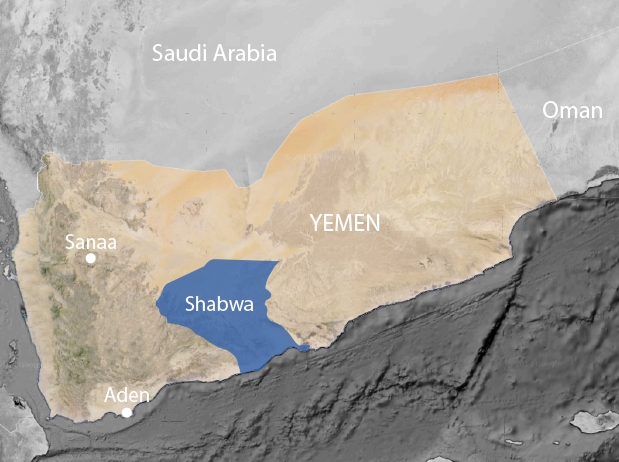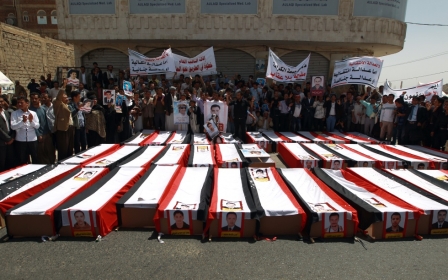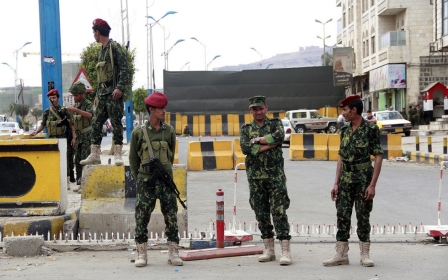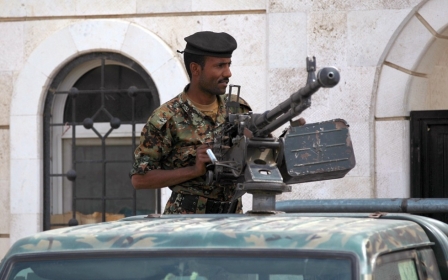Thousands displaced in Yemen as violence continues

More than 22,000 people have been internally displaced in Yemen's southern Shabwa province as a result of fighting between the Yemeni army and alleged al-Qaeda militants, according to the governor of Shabwa.
"We urgently need government assistance to help those displaced", Shabwa Governor Ahmad Bahaj told Yemen's 26 September news website on Tuesday.
Yemen recently launched an offensive against suspected al-Qaeda elements in the south, where the group continues to stage sporadic attacks on army and police targets.
The army has said its forces were able to destroy a number of al-Qaeda hideouts and seize "large amounts" of weapons and explosive-making materials.
Yemeni Shiite rebels kill five soldiers
New MEE newsletter: Jerusalem Dispatch
Sign up to get the latest insights and analysis on Israel-Palestine, alongside Turkey Unpacked and other MEE newsletters
As the displacement in the south goes on, violence in the north continues.
On Tuesday Shiite rebels in northern Yemen attacked army positions and killed five soldiers, prompting renewed clashes between the two sides.
The Shiite Houthi rebels launched attacks on three army posts on the northern and eastern entrances to the city of Amran, 50 kilometres from the capital Sanaa, and wounded several other troops, according to sources who spoke to AFP.
Sources added that a local tribe had backed the Houthi rebels.
The attacks sparked clashes that continued throughout Tuesday morning and left several rebels dead and wounded, according to witnesses.
On 20 May, medics said that 25 soldiers and rebels were killed in similar clashes in Amran, a stronghold of the insurgents who have tried to bolster their standing in the region by holding armed parades and anti-military protests.
The rebels are suspected of trying to enlarge their sphere of influence as the country is set to be split into six regions, pushing out from their mountain strongholds in the far north to areas closer to the capital Sanaa.
The rebels complained that Yemen could be divided into rich and poor regions, under a federalisation plan agreed in February after national talks as part of a political transition.
Houthis have been fighting the central government for years, complaining of marginalisation under ex-president Ali Abdullah Saleh, who was ousted in 2012 after a year of protests.
In February they seized areas of Amran province in fighting with tribes that left more than 150 people dead.
The rebels, known also as Ansarullah, had to withdraw from some of these areas following a truce with the armed tribes and after the army deployed to halt the rebel advance towards the capital.
Yemen judges resume work after 2-month strike
There have been various reactions to the ongoing violence in the region.
Among the reactions to a spate of kidnappings in Yemen was the open-ended strike declared by judges on 26 March.
The move came one day after Judge Mohamed al-Sarwi, head of the Criminal Court in Yemen's northwestern Hajjah province, was kidnapped by unidentified militants.
The abduction came after Sarwi slapped 13 Yemeni revolutionaries with jail terms ranging from five to ten years each for killing policemen in April 2011.
Yemeni judges are resuming work as of Tuesday, following their two-month strike to protest the kidnapping of their colleagues by militant groups and other "violations" against judges.
"The strike was lifted after the judicial authority's demands were met," Judges' Club head Al-Garrah Balaed told Anadolu Agency.
Al-Sarwi was released in early April following mediation by tribal authorities.
Yemeni judges were demanding stepped-up protection for judicial officials and courthouses, complaining of frequent attacks and threats as a result of their rulings.
Middle East Eye delivers independent and unrivalled coverage and analysis of the Middle East, North Africa and beyond. To learn more about republishing this content and the associated fees, please fill out this form. More about MEE can be found here.




